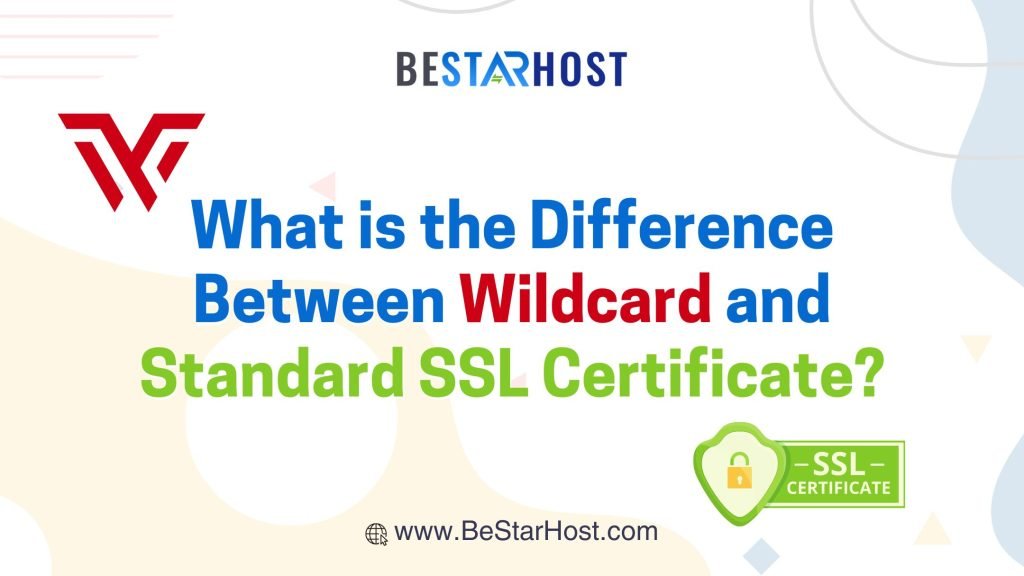
In the realm of online security, SSL (Secure Sockets Layer) certificates play a pivotal role in safeguarding sensitive data transmitted over the internet. Businesses and website owners often face the decision of choosing between wildcard and standard SSL certificates. Understanding the disparity between these two options is crucial for making an informed choice that aligns with specific security needs. Let’s delve into the dissimilarities between wildcard and standard SSL certificates.
What is a Wildcard SSL Certificate?
A wildcard SSL certificate is a type of SSL certificate that allows secure communication between a user’s browser and a website’s server while also providing subdomain security. The standout feature of a wildcard SSL certificate is its ability to secure multiple subdomains under the same primary domain with just one certificate. This means that a wildcard SSL certificate can protect domains like blog.example.com, shop.example.com, and login.example.com, all under the primary domain example.com.
Example: Suppose you own a website with various subdomains such as shop.example.com, blog.example.com, and support.example.com. With a wildcard SSL certificate, all these subdomains can be secured under a single certificate, ensuring encryption for each.
What is a Standard SSL Certificate?
On the other hand, a standard SSL certificate, also known as a single-name SSL certificate or domain-validated SSL certificate, provides encryption for a single domain and does not extend its protection to subdomains. This means that each subdomain would require its own separate SSL certificate for secure communication. While a standard SSL certificate offers robust security for the main domain, it lacks the versatility to cover multiple subdomains.
Example: If you own the domain example.com and want to secure it with a standard SSL certificate, the certificate will only protect traffic to example.com and not to any subdomains like blog.example.com or shop.example.com.
The Contrast: Wildcard SSL vs. Standard SSL Certificates
- Scope of Protection:
- Wildcard SSL: Protects the main domain as well as all its subdomains with a single certificate.
- Standard SSL: Secures only the specified domain without extending its protection to subdomains.
- Management and Cost Efficiency:
- Wildcard SSL: Simplifies certificate management by securing all subdomains under one certificate, potentially reducing costs compared to obtaining individual certificates for each subdomain.
- Standard SSL: Requires separate certificates for each subdomain, leading to higher management overhead and potentially increased costs.
- Flexibility and Scalability:
- Wildcard SSL: Offers scalability for websites with numerous subdomains, providing a cost-effective solution for future expansion.
- Standard SSL: May necessitate additional certificates and management efforts as the number of subdomains grows, potentially leading to complexity and higher expenses.
- Validation Process:
- Wildcard SSL: Undergoes validation for the primary domain and extends its validation to all subdomains, streamlining the validation process.
- Standard SSL: Requires validation for each individual domain, adding complexity, especially for websites with numerous subdomains.
Conclusion
In summary, the choice between wildcard and standard SSL certificates depends on the specific requirements and structure of a website. While wildcard SSL certificates offer convenience, cost efficiency, and scalability for websites with multiple subdomains, standard SSL certificates provide straightforward security for single domains. By understanding the disparities outlined above, website owners can make an informed decision to bolster their online security effectively.
Leave a comment
You must be logged into post a comment.

One comment
Pingbacks and Tracebacks
[…] SSL/TLS certificates are crucial for encrypting data transmitted between your website and its users. Use tools like SSL Labs’ SSL Test to ensure your SSL/TLS configuration is secure and up to date. Check for weak ciphers, outdated protocols, and certificate validity. […]